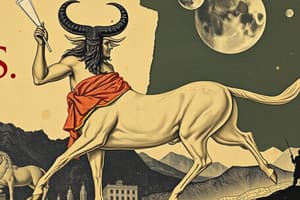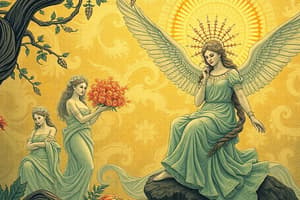Podcast
Questions and Answers
What is Hesiod's Theogony?
What is Hesiod's Theogony?
- A poem that explains the universe (correct)
- A historical narrative
- A philosophical treatise
- A scientific paper
How many Muses are there?
How many Muses are there?
Nine
What is cosmogony?
What is cosmogony?
Birth of cosmos
What does chaos represent?
What does chaos represent?
Who is Gaia?
Who is Gaia?
What is Tartarus?
What is Tartarus?
What is Eros known as?
What is Eros known as?
What is the significance of Kronos castrating Ouranos?
What is the significance of Kronos castrating Ouranos?
How was Aphrodite born?
How was Aphrodite born?
Who are the Hundred Handers?
Who are the Hundred Handers?
What does the Styx give birth to?
What does the Styx give birth to?
What leads to the punishment of Prometheus?
What leads to the punishment of Prometheus?
What is ambrosia?
What is ambrosia?
What does nectar refer to?
What does nectar refer to?
Pandora was created as a gift for mankind.
Pandora was created as a gift for mankind.
What is the Titanomachy?
What is the Titanomachy?
Flashcards are hidden until you start studying
Study Notes
Hesiod's Theogony
- Poem outlining the creation of the universe and genealogy of gods.
- Contains a prologue and various myths about the births of gods.
- Features succession myths that explain the rise of Zeus as the king of gods.
Muses
- Nine Muses from Mount Helicon associated with song, dance, and arts.
- Hesiod emulates the Muses, who grant him a beautiful voice.
Origin of Muses
- Resulted from Zeus' union with Mnemosyne (Memory).
Cosmogony
- Refers to the birth and creation of the cosmos.
Theogony
- Focuses specifically on the birth of the gods.
Chaos
- Considered the first entity in existence, representing space.
Gaia
- The second goddess in existence, symbolizing the Earth.
Tartarus
- Third deity, depicted as the prison for Titans.
Eros
- The fourth god, associated with love (Cupid); notable for being not gendered.
Ouranos
- God of the sky, born from Gaia alone.
Hesiod's Vision of the Cosmos
- Conceptualizes the universe as a layered structure: Chaos at the bottom, followed by Tartarus, Gaia, and finally Ouranos.
Titans
- Offspring of Gaia and Ouranos.
Cyclopes
- Known for strength and craftsmanship; provided Zeus with his thunderbolt.
Hundred Handers
- Children of Gaia and Ouranos, noted for their immense power; freed by Zeus during the Titanomachy.
Kronos and Ouranos' Castration
- Kronos castrates Ouranos, an unusual act in Greek mythology but justified in the Theogony.
Birth of Aphrodite
- Born from Ouranos' severed genitals, also known for her ties to various locations and names (e.g., Kythereia, Philommedes).
Styx
- Goddess and river, progenitor of four gods: Zelos, Nike, Kratos, and Bia; her waters are sacred for oaths.
Hymn to Hekate
- Hekate is a minor deity with significant control and a unique mythological background.
Kronos' Cannibalism and the Stone
- Kronos swallows his children due to a prophecy; Rhea saves Zeus by giving Kronos a stone to swallow instead.
Zeus, Prometheus, and Sacrifice
- Zeus favors the burnt fat over bones during a sacrificial offering, leading to Prometheus' trickery.
Zeus, Prometheus, and Fire
- Zeus punishes humanity by taking away fire; Prometheus steals it back, symbolizing his love for humans.
Punishment of Prometheus
- Zeus torturously confines Prometheus to a pillar, with an eagle consuming his liver daily.
Pandora and Human Females in Theogony
- Created by Zeus as a punishment for humans, embodying negative stereotypes of women in Greek culture.
Titanomachy
- Epic battle between the Titans led by Kronos and the Olympians led by Zeus.
Ambrosia
- Food of the gods, symbolizing immortality.
Nectar
- The divine drink enjoyed by the gods, associated with immortality.
Studying That Suits You
Use AI to generate personalized quizzes and flashcards to suit your learning preferences.




